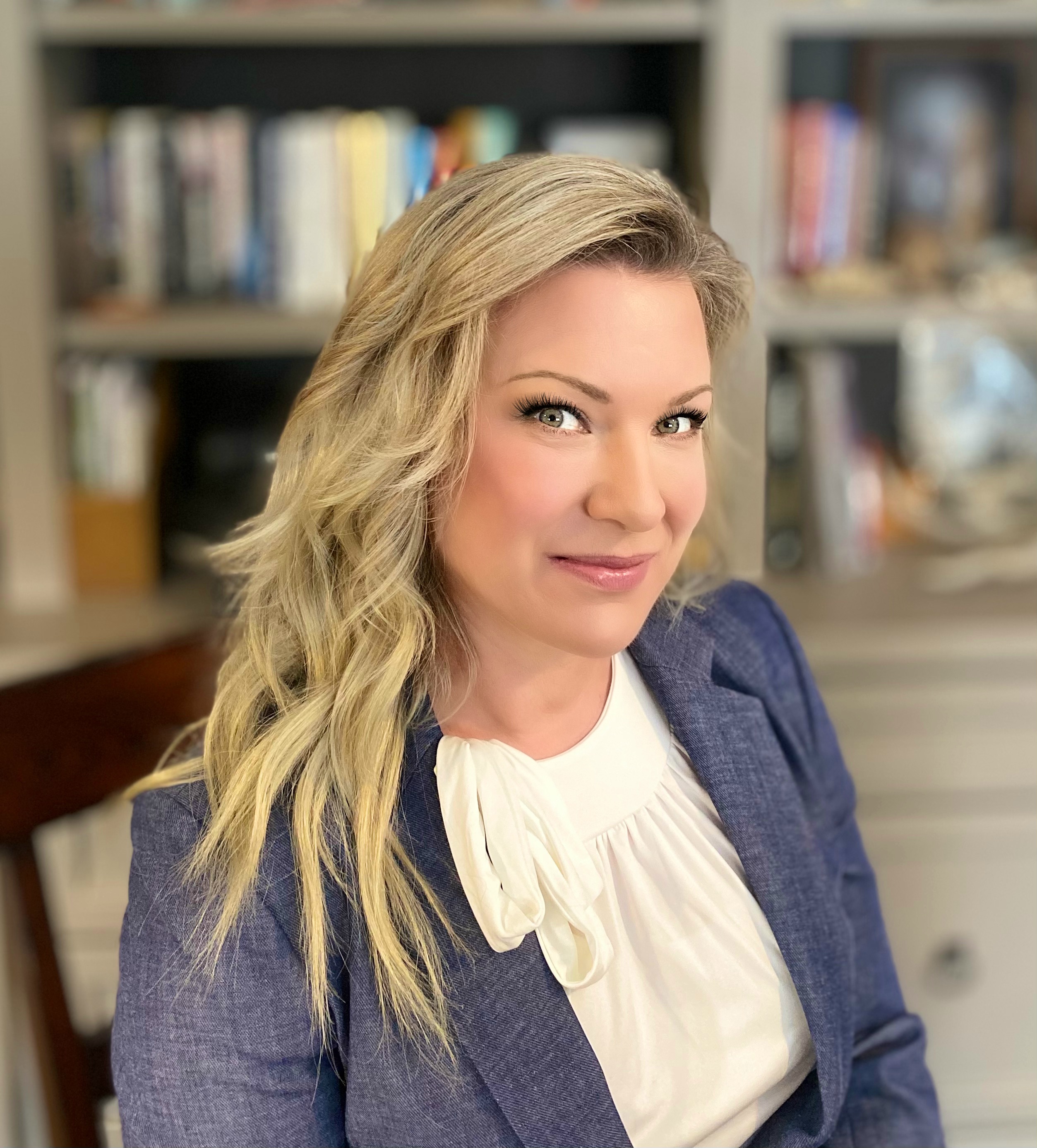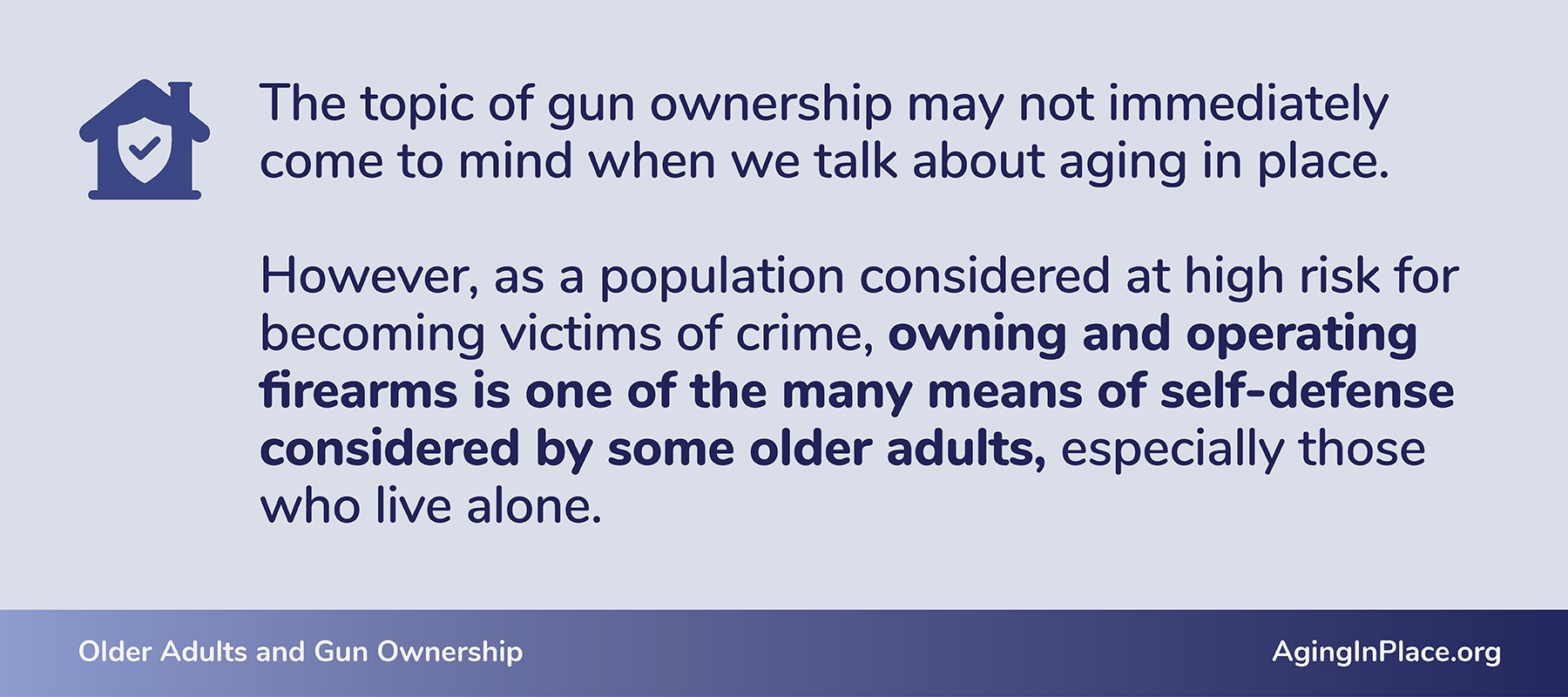
For 74-year-old avid bird hunter and retiree Stu M., gun ownership is about both recreational hunting and keeping his home and his wife safe. Stu keeps two guns for home protection and several others for small-game hunting and target and clay shooting locked in a combination safe. “Criminals go where there’s the least resistance,” he said. “They will not go to the home with signage about the owner being heavily armed. They’ll go to the unarmed next-door neighbor.”
Stu, who has been shooting firearms since the age of 10, feels very comfortable with them and carried a handgun in his survival vest as a Navy fighter pilot in Vietnam. He is safety-conscious and makes a point to continually practice several times a year.
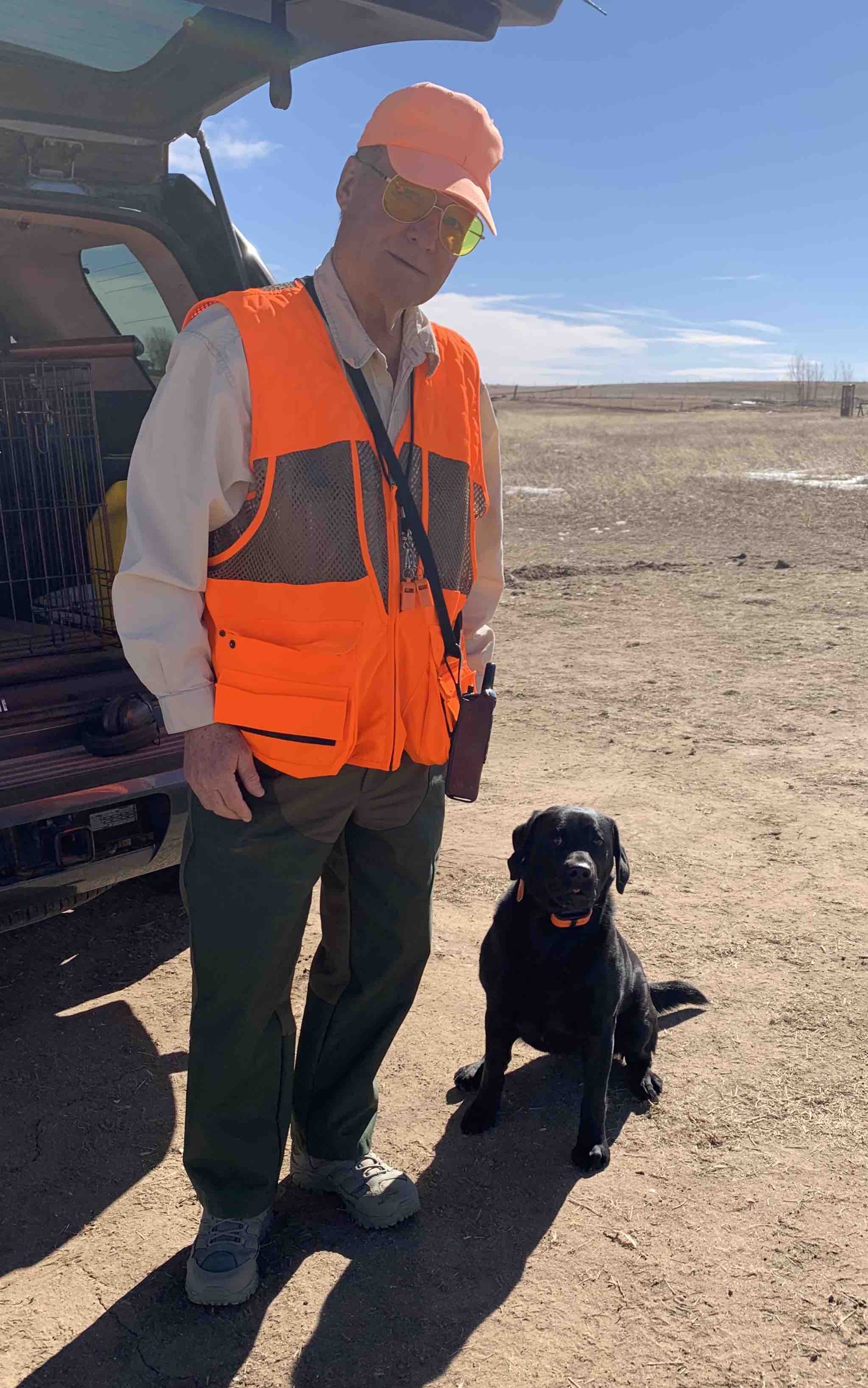
Stu’s stance regarding guns falls in line with research surrounding gun ownership in the U.S. According to a PEW Research Center study, adults who grew up with guns in their households (42%) are more likely to be gun owners later in life.
No matter which side of the debate you’re on regarding gun rights in the U.S., advanced age alone does not preclude anyone from owning a firearm.
Reasons for Older Adults to Own a Gun
According to the Kaiser Family Foundation, 33% of people over 65 report owning at least one gun. Older adults want guns for the same reasons anyone wants a gun—protection against crime, target shooting, hunting, and collecting. In a 2019 Gallup poll, 88% of respondents who were gun owners reported owning guns for personal protection.
Frank Fancone, owner and senior firearm instructor at Straight Forward Shooting, reported seeing a sharp increase in enrollees in his training classes beginning in 2020. He also reported a shift in the demographics of his enrollees, with more older adults, women, and minorities than ever before. He feels that this recent shift is due to the fear and uncertainty caused by the COVID pandemic, as well as political unrest.
Francone’s initial observations are supported by statistics. SafeHome.org reported that 13.5 million background checks were conducted for gun sales in the U.S. in 2019. That number jumped to 21.5 million in 2020, then dropped very slightly to nearly 19 million in 2021.
Research on older adults shows that they are more afraid of crime than younger people, especially older women and those in poor health. Ken Lombardi, 82, of Denver, said that having a gun definitely makes him feel safer. “If someone breaks in at 3 a.m. what else are you going to do?” While Lombardi has owned a gun for home protection for most of his adult life, he said, “Times are scarier nowadays.”
However, other forms of self defense may be more effective than a gun, noted Ayla Girouard, a licensed practical nurse specializing in geriatric and long-term care. “For those who are using it as property protection or self defense, older adults may have slow reaction times, tremors, and weaker extremities that could make other methods easier and actually more effective—like loud alarms, bright or flashing lights, or emergency alert systems,” she said. “In the time it may take an older adult to access, engage, and shoot their firearm they could very easily miss their opportunity, versus triggering an alarm that could send off an intruder much faster.”
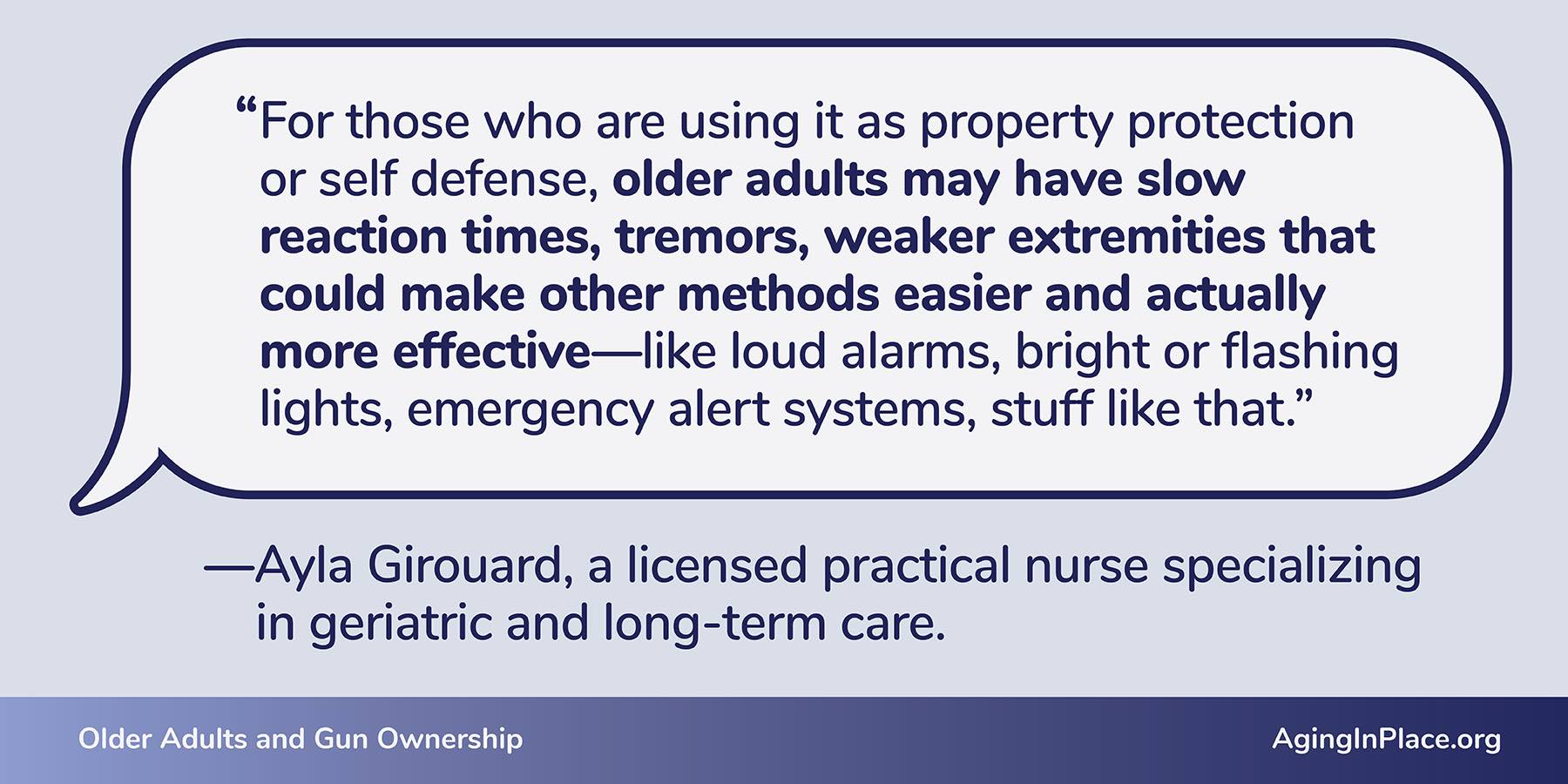
Considerations for Older Adults Owning a Gun
Consider the Consequences
It’s no secret that owning and potentially using a gun may mean you could shoot someone. It’s important to fully understand that causing a life-threatening injury or the act of taking a life are the potential consequences of owning a gun. Other consequences of gun ownership include an increased chance of suicide, homicide, domestic violence, and accidents.
Gun Laws in Your State
Gun laws can vary greatly from state to state and change over time. It’s important to have a good grasp of the current laws in your state as well as any states you’ll be traveling through or to with firearms. You can look up your state’s gun laws on the Bureau of Alcohol, Tobacco, Firearms, and Explosives website. Your state may have limits on the type of gun you are allowed to own or specific laws about how you must store it.
Mental and Physical Health
Safe and responsible gun ownership requires sound and stable mental and physical health. Under U.S. federal law, 18 U.S.C. § 922(d), it’s unlawful for any person to sell or otherwise dispose of any firearm or ammunition to any person knowing or having reasonable cause to believe that such person “has been adjudicated as a mental defective or has been committed to any mental institution.”
How is this relative to your decision to purchase a gun as an aging adult? Dementia and depression are a great concern for the older adult population. In 2019, 10% of adults over the age of 70 had dementia. And yet, a diagnosis of dementia does not disqualify someone from owning a gun. However, there are reports of accidental shootings involving individuals with dementia and suicides in depressed older adults. Among men in the U.S., the suicide rate is highest among those 65 and older, with firearms being the most common method. So while the majority of older adults are not depressed, depression in older people is estimated to range from less than 1% to about 5%—and rises to 13.5% in those who require home health care.
“If a family member is starting to suspect an emerging cognitive impairment, and the person with the cognitive impairment has a gun (or guns) in the house, discussion with a qualified health care professional is paramount,” said Christopher Norman, a board-certified geriatric nurse practitioner and holistic nurse.
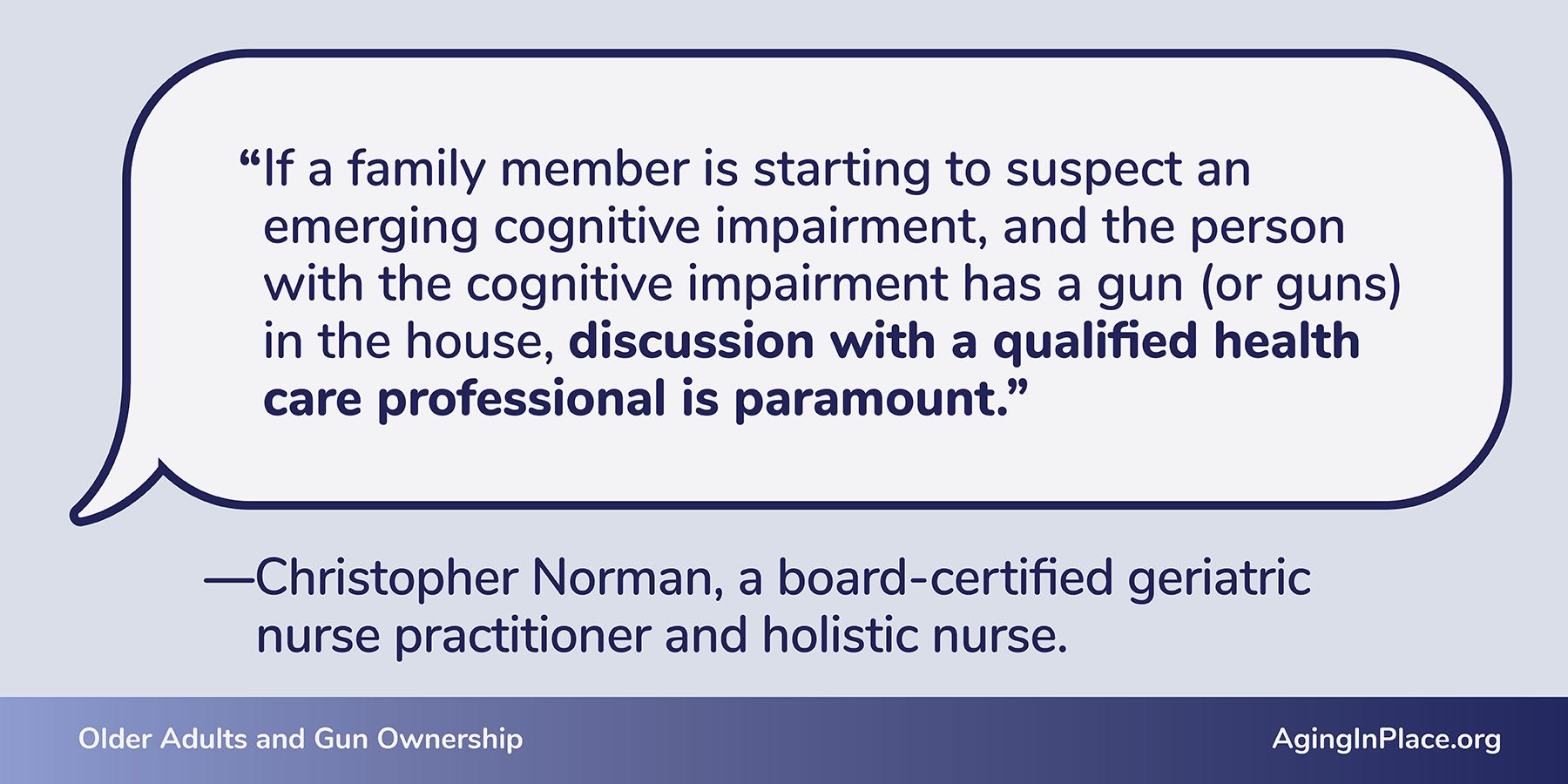
In addition to the above mental and psychological considerations, some physical considerations for older adults with guns could include difficulties with vision or hearing or disorders that cause tremors, decreased coordination, or weakness. Anyone experiencing these types of symptoms may not be able to safely operate a firearm.
It’s important that aging gun owners continually self-assess as well as discuss their mental, psychological, and physical health with their doctors and loved ones. “I believe every primary care doctor should be asking all of their patients about guns in their home, regardless of age,” said Dr. Nicholas Duff, an internal medicine resident at Sky Ridge Medical Center in Lone Tree, Colo. “I would be looking for any signs of memory decline or any other deficit such as hearing or eyesight that might impair their judgment or abilities. We are taught this in medical school, however I don’t think it’s practiced very often in the real world, unfortunately.”
Most older adults are able to safely own and handle guns throughout their golden years, but, as difficult as the conversation may be, it’s everyone’s responsibility to remove guns from the homes of those struggling with any of the above-mentioned difficulties.
While Stu doesn’t feel that he has had to make special considerations for his age yet, he pointed out that it’s important that gun owners are mentally and physically capable and that loved ones should intervene if they suspect their family member’s gun ownership becomes unsafe.
Responsible Gun Ownership
Ensure the Appropriateness of Your Gun
As with anyone operating a firearm, it’s important that the particular weapon you’re using aligns with your reasons for use and your physical capabilities.
According to Francone, there are some specific considerations for the older adult when selecting a firearm. “Hand strength and dexterity can be an issue (of course only for some, not all seniors) so I generally do not recommend higher caliber weapons for those with weaker hand strength.”
Also, the type of gun you want depends on its intended use. Following is a list of possible uses:
- Home defense
- Concealed carry
- Target shooting
- Hunting
- Competition
- Collecting
Know How to Use It
It’s imperative that anyone owning a gun knows how to safely operate it. If you’re unfamiliar with firearms and don’t know basic gun safety rules, taking a gun safety course will help you learn the ins and outs of safe gun ownership. Gun safety courses are prevalent throughout the U.S. You can easily search online with a website like shootingclasses.com to find a training course in your area.
This will also give you the opportunity to ask any questions you may have while getting advice from someone who is an expert in gun ownership. If your goal is to carry your gun concealed when you’re out of the house or to carry it in your vehicle as you travel, this type of course may be required, depending on your state’s individual laws.
Practice Regularly
If you own a gun, you want to become very familiar with it. Francone recommended frequent “dry practice” at home (without ammunition) as well as monthly shooting practice at a range. If you own a gun for self-defense purposes, take the time to practice real-life scenarios so you get a better feel for the types of situations you could actually encounter and how to best respond. For instance, if you keep the gun in a safe next to your bed, practice getting to it and opening it in the dark.
General Gun Safety Guidelines
There are general rules of gun safety that should always be followed, regardless of age. Some rules include: keeping the gun unloaded until ready to use, using the correct ammunition, and wearing proper eye and ear protection as needed. Additionally, never operate a firearm while under the influence of alcohol or drugs. This means fully understanding the side effects of any prescription medication you take on a daily or recurring basis. For more on general gun safety guidelines, visit Field & Stream.
Know the Self-Defense Laws in Your State
There is not a one-size-fits-all answer to the question of gun use in self-defense because laws vary from state to state. Laws in at least 28 states and Puerto Rico allow that there is no duty to retreat an attacker in any place in which one is unlawfully present. Some of those states use “stand your ground” verbiage, which protects the use of deadly force for self-defense in the home. You can also research concealed carry laws in your state in order to find out if a permit is required.
Most jurisdictions have three standards that must be met prior to using a gun for self-defense:
- The threat must be imminent. In other words, there was nothing you could do to stop the threat (like run away or otherwise thwart the attack) other than shoot.
- Meet the standard of a “reasonable man,” which basically asks whether a reasonable person in your situation would have shot the gun as well.
- The threat must be capable of causing death or, at a minimum, major bodily harm. If it isn’t, you’re typically not legally justified in shooting.

Other factors that could potentially impact your legal ability to use a gun for protecting yourself include whether the threat is credible (the assailant can actually engage in a life-threatening action) and whether you’re an innocent party to the attack (you didn’t provoke it).
Inform Others
If you plan to have visitors in your home, especially if they are staying overnight, make them aware that you have a gun on the premises and lock it up.
Storage
Just as it is important to follow safe gun procedures when carrying or using a firearm, it’s also critical to follow safe storage practices. It’s your responsibility to keep your gun from getting into the wrong hands. Consider the possibility of visitors, especially children, and burglary. Some states have laws around the storage of guns in the home so it’s important to check on this when making determinations about how you will store your firearm. Guns should always be stored unloaded.
When considering where you will store your gun, you don’t want the firearm accessible enough to get into the wrong hands. However, you want to be able to easily access it should the need arise. If you have a large number of visitors to your home or if children come around at all, guns should be locked in a safe or stored up high, way out of reach, with no way for little ones to get to them. Make sure they can’t use a chair or step ladder to access the gun and make sure to tell them and their friends that they are forbidden from searching for guns. Remember, children can be incredibly resourceful and curious.
Gun safes are the most secure storage option. If you decide to use a gun safe, keep in mind any personal limitations you may have in accessing it. For instance, you need more fine motor skills to use a key or enter a combination, whereas a biometric safe with fingerprint access may be easier if this is a concern. Fine motor skills may be even more of an issue in a life-or-death scenario as research has found that once your heart rate goes above 115 beats per minute, these skills start to decline. Francone recommended biometric safes to his older class participants.
Another way to improve gun safety is to use a lock. Some locks are meant to loop through the barrel to keep it from firing and others involve putting a guard over the trigger so that it can’t be fired. The one thing to keep in mind with any type of lock is that most do require a certain steadiness of hand to remove them. Additionally, guns can be stored in locked gun cases, strong boxes, security cases, or gun cabinets.
Maintenance and Cleaning
Finally, to get the longest life and best performance out of your gun you must clean, lubricate, and store it properly. Proper cleaning and maintenance of your gun prevents rusting and a number of other issues that could cause it to become unreliable or even dangerous to you.
It’s important to refer to the user’s manual for specific cleaning instructions.
For rarely-used self-defense guns, a thorough monthly inspection and cleaning are ideal, although some may choose to do this only two to three times per year. You can elect to have your gun cleaned professionally at a gun store or range or do it yourself with the user’s manual. Cleaning it yourself is feasible for most owners and has the added benefit of helping you better understand how your gun works.
In Conclusion
While the majority of older adults can safely own and use guns well into their later years, it’s important for older adults, as with anyone owning guns, to follow the safety tenets outlined above. It is also important that attention is paid to signs that gun ownership may be becoming unsafe such as developing dementia, declining vision, or unstable mental health. That can be a difficult conversation. According to Today’s Geriatric Medicine, “Even under the best of circumstances, discussions about limits to gun access are delicate and emotionally charged. That complexity, compounded with the painful realities of dementia, prompts many families to put this particular conversation on a back burner and simply hope for the best.”
Colorado Deputy Sheriff Nelson Trumbull, who asked us not to name his department, has personally witnessed some dismaying consequences of mentally unfit gun owners, and yet, he also enjoys joining his 82-year-old father at the range, where he continues to safely shoot twice a week. “As long as an older adult’s physical, visual, and mental capacities are intact, there is no reason they cannot continue to safely own and use guns,” he said. “The physical capacities may be easy to see but the mental ones are often more difficult to notice.”
